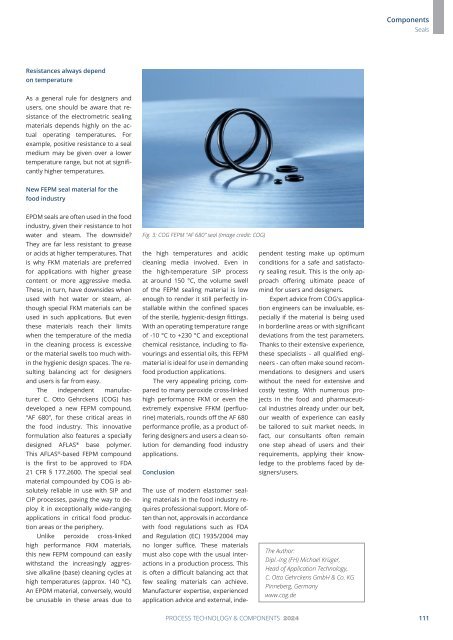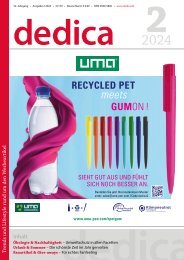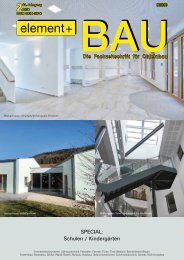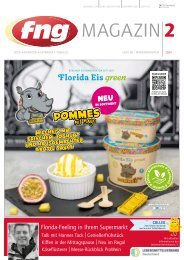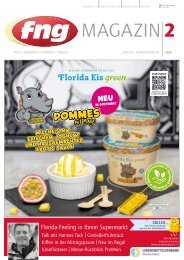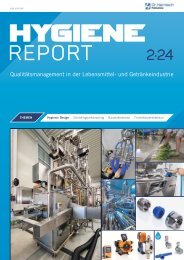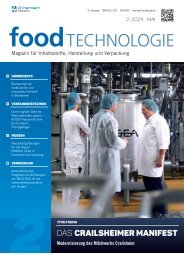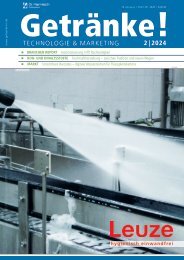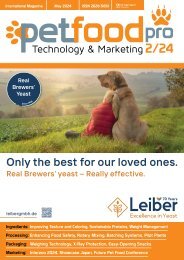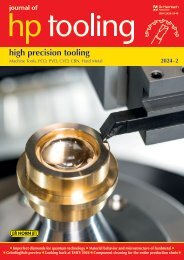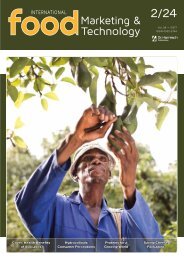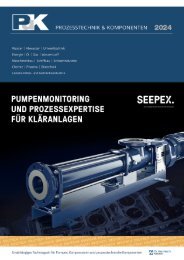PuK - Process Technology & Components 2024
A technical trade magazine with a history of more than 60 years.
A technical trade magazine with a history of more than 60 years.
You also want an ePaper? Increase the reach of your titles
YUMPU automatically turns print PDFs into web optimized ePapers that Google loves.
<strong>Components</strong><br />
Seals<br />
Resistances always depend<br />
on temperature<br />
As a general rule for designers and<br />
users, one should be aware that resistance<br />
of the electrometric sealing<br />
materials depends highly on the actual<br />
operating temperatures. For<br />
example, positive resistance to a seal<br />
medium may be given over a lower<br />
temperature range, but not at significantly<br />
higher temperatures.<br />
New FEPM seal material for the<br />
food industry<br />
EPDM seals are often used in the food<br />
industry, given their resistance to hot<br />
water and steam. The downside?<br />
They are far less resistant to grease<br />
or acids at higher temperatures. That<br />
is why FKM materials are preferred<br />
for applications with higher grease<br />
content or more aggressive media.<br />
These, in turn, have downsides when<br />
used with hot water or steam, although<br />
special FKM materials can be<br />
used in such applications. But even<br />
these materials reach their limits<br />
when the temperature of the media<br />
in the cleaning process is excessive<br />
or the material swells too much within<br />
the hygienic design spaces. The resulting<br />
balancing act for designers<br />
and users is far from easy.<br />
The independent manufacturer<br />
C. Otto Gehrckens (COG) has<br />
de veloped a new FEPM compound,<br />
“AF 680”, for these critical areas in<br />
the food industry. This innovative<br />
formulation also features a specially<br />
designed AFLAS ® base polymer.<br />
This AFLAS ® -based FEPM compound<br />
is the first to be approved to FDA<br />
21 CFR § 177.2600. The special seal<br />
material compounded by COG is absolutely<br />
reliable in use with SIP and<br />
CIP processes, paving the way to deploy<br />
it in exceptionally wide-ranging<br />
applications in critical food production<br />
areas or the periphery.<br />
Unlike peroxide cross-linked<br />
high performance FKM materials,<br />
this new FEPM compound can easily<br />
withstand the increasingly aggressive<br />
alkaline (base) cleaning cycles at<br />
high tempera tures (approx. 140 °C).<br />
An EPDM material, conversely, would<br />
be unusable in these areas due to<br />
Fig. 3: COG FEPM "AF 680” seal (Image credit: COG)<br />
the high temperatures and acidic<br />
cleaning media involved. Even in<br />
the high-temperature SIP process<br />
at around 150 °C, the volume swell<br />
of the FEPM sealing material is low<br />
enough to render it still perfectly installable<br />
within the confined spaces<br />
of the sterile, hygienic-design fittings.<br />
With an operating temperature range<br />
of -10 °C to +230 °C and exceptional<br />
chemical resistance, including to flavourings<br />
and essential oils, this FEPM<br />
material is ideal for use in demanding<br />
food production applications.<br />
The very appealing pricing, compared<br />
to many peroxide cross-linked<br />
high performance FKM or even the<br />
extremely expensive FFKM (perfluorine)<br />
materials, rounds off the AF 680<br />
performance profile, as a pro duct offering<br />
designers and users a clean solution<br />
for demanding food industry<br />
applications.<br />
Conclusion<br />
The use of modern elastomer sealing<br />
materials in the food industry requires<br />
professional support. More often<br />
than not, approvals in accordance<br />
with food regulations such as FDA<br />
and Regulation (EC) 1935/2004 may<br />
no longer suffice. These materials<br />
must also cope with the usual interactions<br />
in a production process. This<br />
is often a difficult balancing act that<br />
few sealing materials can achieve.<br />
Manufacturer expertise, experienced<br />
application advice and external, independent<br />
testing make up optimum<br />
conditions for a safe and satisfactory<br />
sealing result. This is the only approach<br />
offering ultimate peace of<br />
mind for users and designers.<br />
Expert advice from COG's application<br />
engineers can be invaluable, especially<br />
if the material is being used<br />
in borderline areas or with significant<br />
deviations from the test parameters.<br />
Thanks to their extensive experience,<br />
these specialists - all qualified engineers<br />
- can often make sound recommendations<br />
to designers and users<br />
without the need for extensive and<br />
costly testing. With numerous projects<br />
in the food and pharmaceutical<br />
industries already under our belt,<br />
our wealth of experience can easily<br />
be tailored to suit market needs. In<br />
fact, our consultants often remain<br />
one step ahead of users and their<br />
requirements, applying their knowledge<br />
to the problems faced by designers/users.<br />
The Author:<br />
Dipl.-Ing (FH) Michael Krüger,<br />
Head of Application <strong>Technology</strong>,<br />
C. Otto Gehrckens GmbH & Co. KG<br />
Pinneberg, Germany<br />
www.cog.de<br />
PROCESS TECHNOLOGY & COMPONENTS <strong>2024</strong><br />
111


